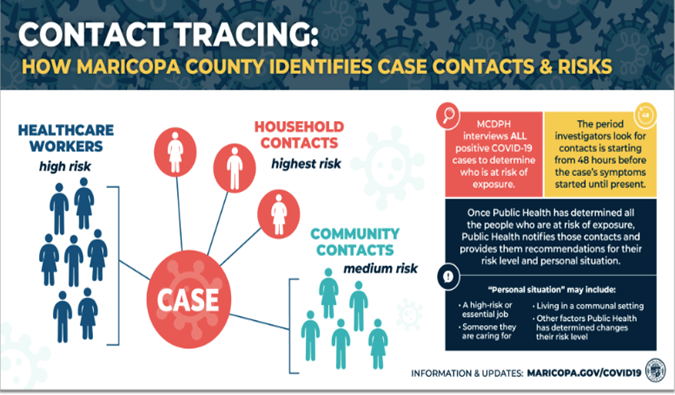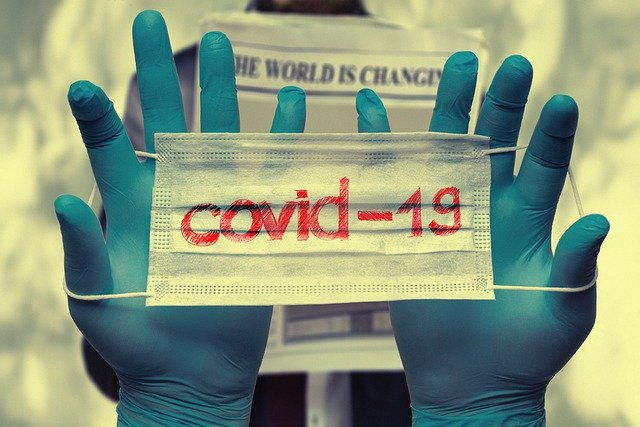As testing for COVID-19 in Maricopa County and across the state increases, public health officials are sprinting to hire more contact tracing employees to be able to track every person who has had contact with an infected person.
Contact tracing is considered an effective tool in the arsenal to fight the disease’s spread. Employees work by phone with infected patients to discover everyone they had contact with who may have been exposed.
Last week, the county approved hiring 60 employees to add to the tracking team, said County Supervisor Bill Gates, who also is a member of the county Board of Health.
“Contact tracing is a key piece of reopening the economy and being successful and being safe,” Gates said. “We’re increasing our capability to contact trace eight to 10 times over what we’ve been doing.”
Coronavirus tracking apps could be coming in the future
Across the U.S., health departments are scaling up contact tracing as well.
Many countries and some states also are turning to contact tracing apps to help reduce the spread of Covid-19 and get their societies back up and running. While their functions vary, the basic concept is to allow people to voluntarily use their smartphones to automatically trace their encounters with others.
They use either a GPS-based or Bluetooth approach, or a combination of both, for tracking people who have been in contact with infected patients.
Currently, Apple and Google are among the companies working to perfect a contact tracing app for health agencies that will have enhanced privacy features.
Maricopa County Public Health officials would consider using technology to help with contact tracing if it is proven safe and effective, said the county’s communications director, Fields Moseley.
“Maricopa County wants to reach and help as many people as possible who might be at risk. At the same time, we will only use technology that is proven to work well, fits into our business operation and will protect people’s privacy,” Mosely said.
County hiring for contact tracing team
For now, health officials are focused on hiring and training workers to call infected patients and trace who they have had contact with in the past two or three weeks in case they need to quarantine during the 14-day infection phase.
“This is painstaking work but it’s so important,” Supervisor Gates said. “We will staff up as much as we need to.”
The health department has done contact tracing for every confirmed case of COVID-19, beginning with the first case Jan. 26, Gates said. As testing numbers have soared, so has the need for more contact tracing workers.
Last week, the county posted multiple job descriptions for a variety of positions. More than 300 applications have been received. On Monday, 20 new hires were in place. Epidemiologists, investigators and support staff are among those being hired.
The county also is contracting with the nonprofit Crisis Response Network, or 211, to help with the effort. Crisis hotline workers already are fielding calls from anyone who has questions about the coronavirus.
How contact tracing works

Contact tracing is conducted by trained investigators who must act as “part public health, part detective and part social worker,” the public health department said in a statement announcing the hiring effort.
“They must work closely and quickly with positive cases to establish trust, uncover as much information as possible, and then decipher this information to put it into public health interventions.”
There are a series of steps that must be taken including:
• After a positive case is reported, an investigator reaches out to the individual by phone and conducts an extensive interview to determine who they have had contact with in the prior two to three weeks.
• The investigator then reaches out to any family members and health care providers who may have been exposed. After that, casual contacts and businesses are contacted to warn them of potential exposure.
• If a contact is required to be quarantined, the investigator will help to ensure the contact’s basic needs, including healthcare and food, are met.
• The investigator continues to check up on close contacts to see if they have developed symptoms. Anyone who develops symptoms is given instructions on how to seek healthcare safely without exposing others in the doctor’s office or ER waiting room.
Potential job applicants and volunteers, can get more information at: COVID-19 help.
Anyone who is sick and suspects they have the virus, or have been around someone who is sick, or are caring for someone who is sick, can get details on how to protect themselves and others at: sick or exposed. For more information on COVID-19 and what steps can be taken to stop the spread, visit Maricopa COVID19 or for the Spanish version at Maricopa COVID19 Enfermedad.
This story was originally published at Chamber Business News.




